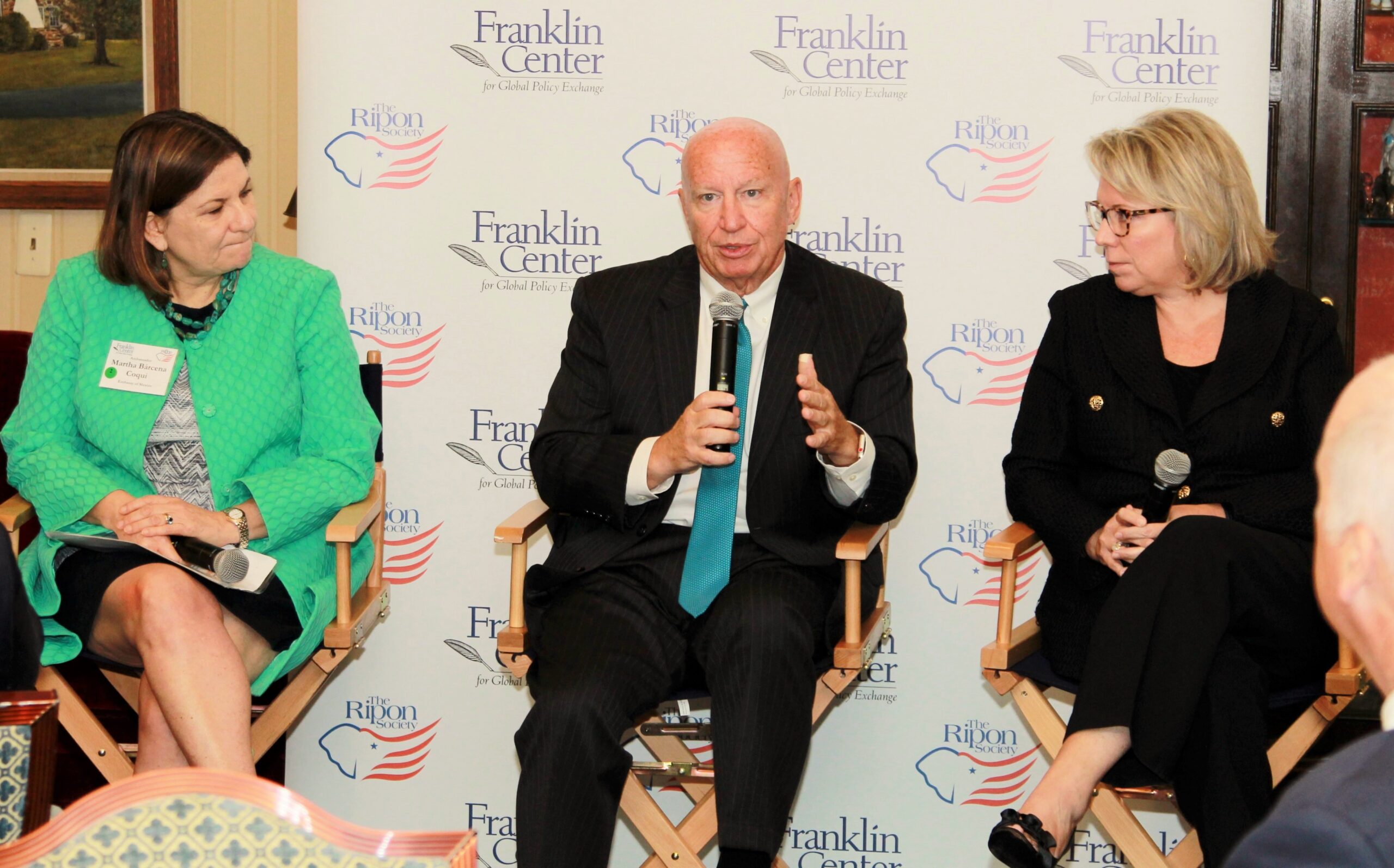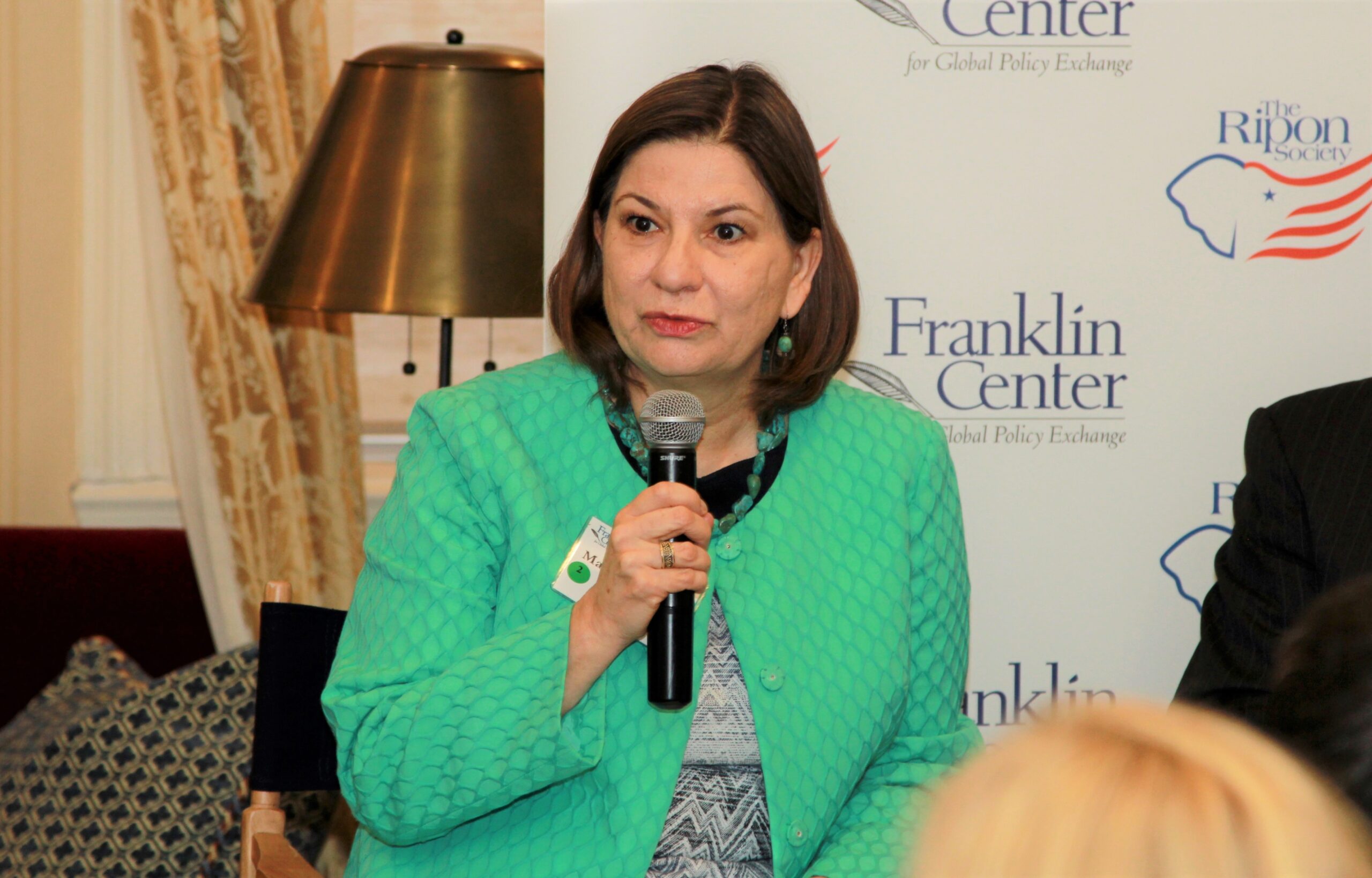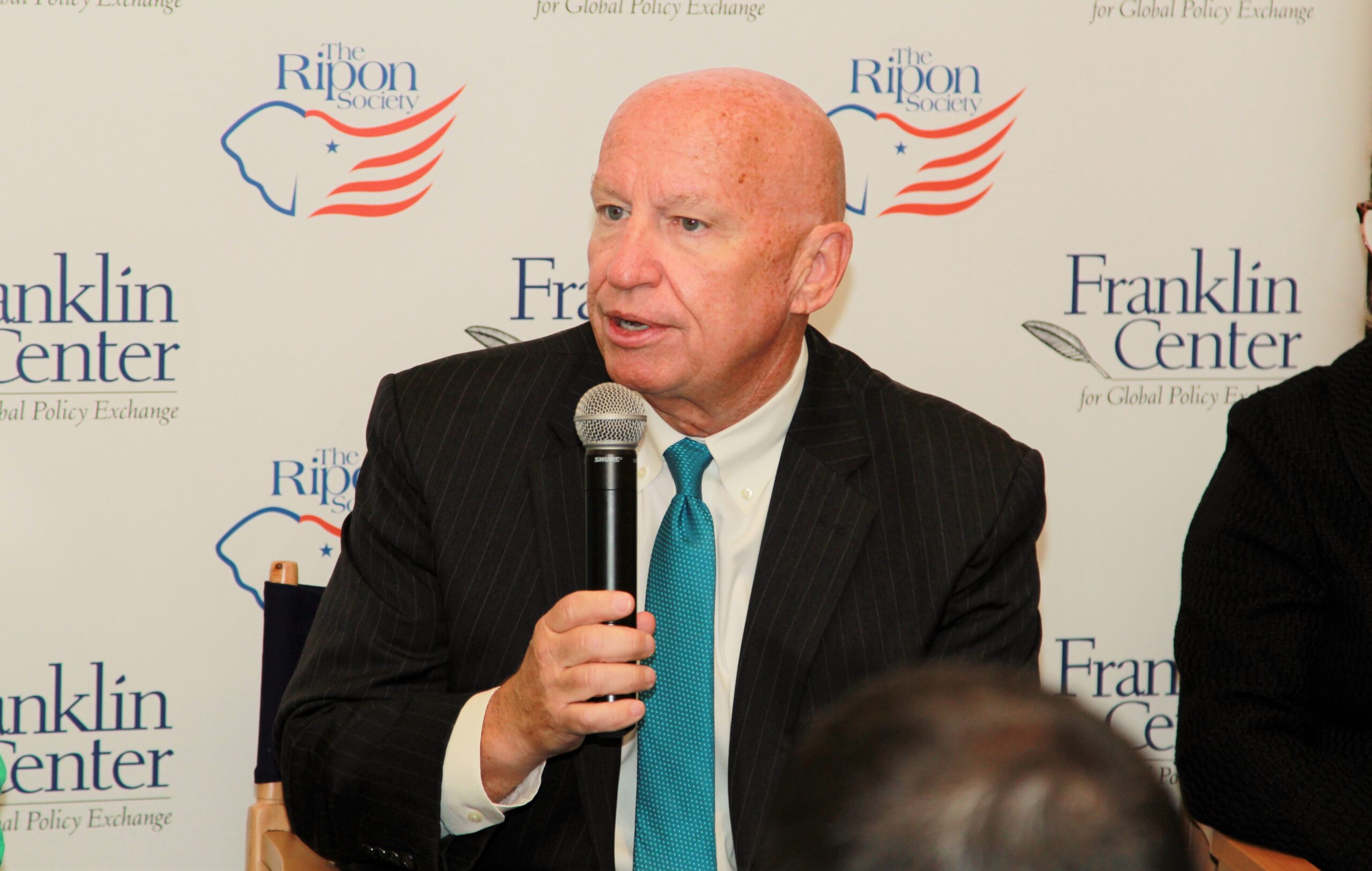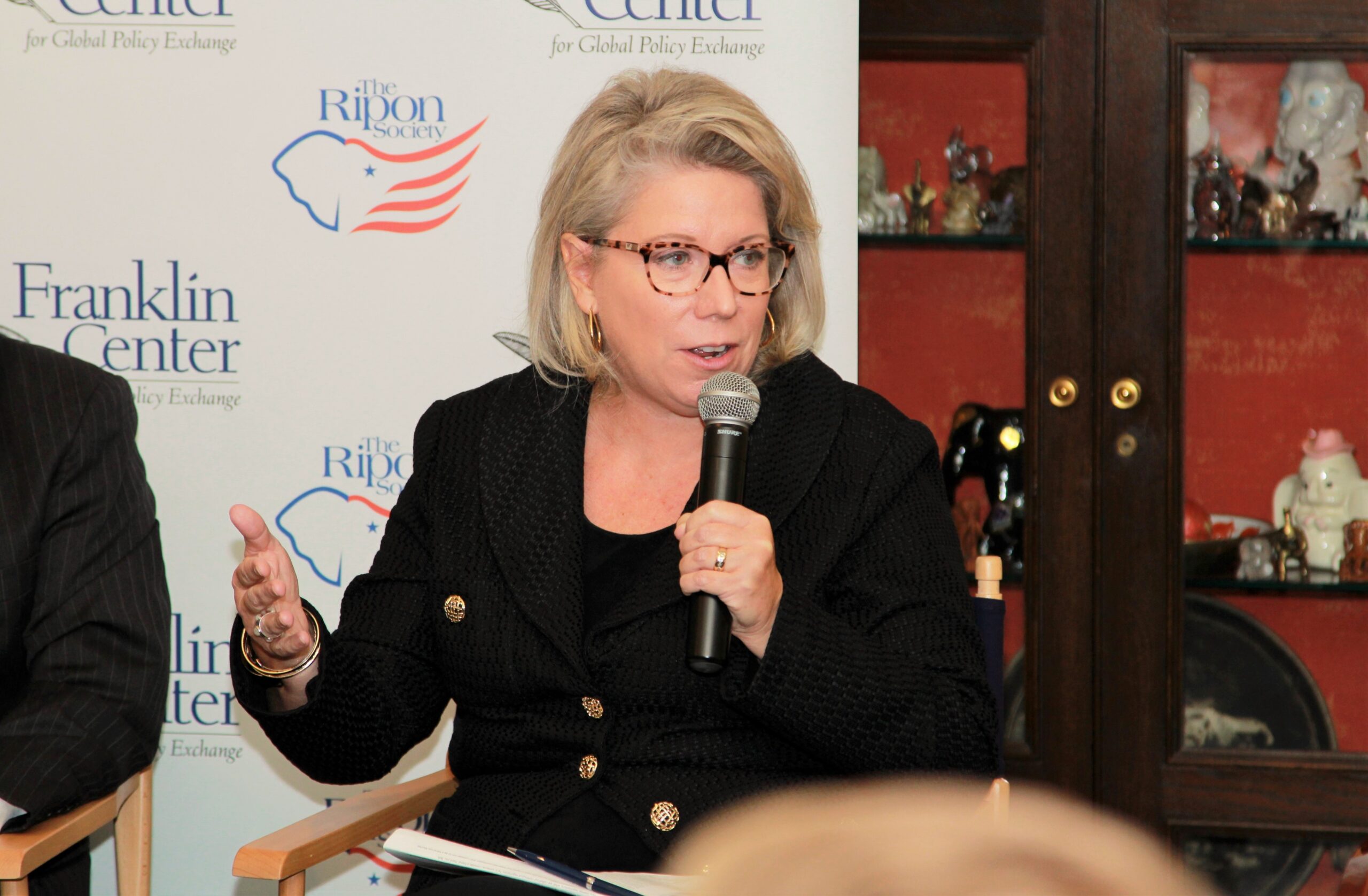 Bárcena, Brady, and Greenwood Tout Benefits of USMCA & the Need to Get It Approved
Bárcena, Brady, and Greenwood Tout Benefits of USMCA & the Need to Get It Approved
WASHINGTON, DC — With the American economy thriving but uncertainty continuing to hang over the future of free and fair global trade, The Ripon Society and Franklin Center for Global Policy Exchange held a breakfast discussion yesterday morning with three leaders who are working to ratify the U.S.-Mexico-Canada Agreement (USMCA), a plan that would modernize the current trade agreement between the three countries, NAFTA, and provide individuals and businesses with an updated regulatory environment in which they can work and compete.
The leaders included: Mexican Ambassador to the United States Martha Bárcena Coqui; Ways and Means Committee Ranking Member Kevin Brady (TX-8); and Scotty Greenwood, CEO of the Canadian American Business Council. Former Minnesota Congressman Erik Paulsen, who served on the Ways & Means Trade Subcommittee while in office and now serves as Honorary Co-Chair of a coalition pushing to pass the USMCA, moderated the discussion. Ambassador Bárcena, who became the first female ambassador of Mexico to the United States this past January and has served in the Mexican Foreign Service since 1979, spoke first, emphasizing Mexico’s commitment to the new trade deal and the new provisions regarding labor reform.
Ambassador Bárcena explained that ratification of USMCA is what is considered in Mexico a “State decision” that goes beyond a specific administration. “Why? As you know, USMCA was negotiated by the previous government.” The team of observers of then President-elect López Obrador participated only in the last part of the negotiations, yet their involvement “meant that the previous government and the current one are totally committed to USMCA ratification. And that is why President López Obrador sent the agreement to the Senate where it was ratified almost unanimously.”
As part of President López Obrador’s electoral commitment to the improvement of conditions for workers, the Ambassador explained that when he arrived into power, “one of his priorities was to approve a revolutionary labor reform.” The changes “are a 180 degree change from what was previously the labor law in Mexico.”
Along with this progress domestically, Bárcena emphasized the need for the full ratification of the USMCA by the United States and Canada.
“We need to get the USMCA ratified because of basically one word: stability. Or, two words: stability and certainty. We need stability and certainty for the economic development of Mexico, of the U.S., and also to give the legal framework that businesses need for long-term investments. There are a lot of decisions that are on hold because people and companies do not know what is going to happen.”
Congressman Brady followed, outlining why he supports U.S. ratification as soon as possible.
“The reason I’m so involved with free trade is because I think this is the greatest freedom you can find,” the Texas lawmaker said. “And that freedom is the heart of our free enterprise system. It has the ability to not just lift families and communities, but whole countries out of poverty.”
“All of our consumers have greater choices and more affordable products. We’re all able to sell more of what we’ve made, including made in America products. Energy has become more affordable and available to all of us. And when you put the strengths of Mexico, Canada, and the U.S. together, all of our businesses can, because of that, compete and win anywhere in the world against anyone in the world. NAFTA has been remarkably successful, but it did need to be modernized.”
The Texas lawmaker continued: “I think we are making real progress. We built a lot of momentum coming out of August, and a lot of work was done back home. Agriculture, manufacturing, technology, and small businesses all reached out to Members of Congress, and I think we came back even stronger than when we left. I think Speaker Pelosi and the working groups are working in good faith to sort of do the final fine tuning here. I think there are very constructive discussions making progress. I think Chairman Neal and Speaker Pelosi have made it clear that there is a path to ‘yes.’ They’re working to get there, and so we are all working to be constructive to see that accomplished.
“Again, this is an opportunity for us. Mexico has ratified it, Canada; we will hear, is ready to go. So it’s really up to us. Every day we delay puts us at a disadvantage; the inability to take advantage of this new agreement, to sell more goods and services, to be able to compete against the Chinas of the world has a big impact on all three of our countries. It is time to ratify this agreement – sooner rather than later – and I’m hopeful we can.”
Greenwood, who spent four years as Chief of Staff of the U.S. Embassy in Canada where she received the State Department’s Meritorious Honor Award, agreed and outlined what free trade means to the Canadian people and Canadian businesses.
“USMCA is so important for the economy as Chairman Brady said. It is so important for our way of life and our livelihood. I think the importance of it, the substance of it, the impact on our economy, workers, businesses, labor, farmers, ranchers, you name it, I think that will win the day and will overwhelm whatever potential political differences that arise from time to time.”
“Canada really understands that it’s important for trade,” Greenwood said of the political landscape. “I’m hoping that in the United States we are close to a time where the debate about whether or not it’s important to have a North American agreement is also beyond politics, that the substance and the benefits of working together will really overwhelm whatever disagreements there might be. The NAFTA wasn’t a perfect agreement, but I agree, Mr. Chairman, it was really good for all three countries.”
Pointing to the strength of the relationship between the United States, Canada, and Mexico as neighbors and the difficulty to finalize USMCA, Greenwood expressed concern for the fate of other trade negotiations for the U.S.
“We’re looking at engaging in a globally interconnected world. Our American businesses, farmers, workers need to be able to engage with their global supply chains and their global customers. And honest to goodness, if we can’t get this deal done, how in the world do we expect to do a deal with anyone else in the world really?”
Following their opening remarks, the three leaders took a number of questions, including one about areas where the USMCA improved current law, and areas where it comes up short.
“My President has said many times that the perfect is enemy of the good,” Ambassador Bárcena remarked. “We know that the agreement is not perfect. But it is good, and it reflects the balance of the negotiations. Each country had to concede something … We ratified it acknowledging that it was a good agreement, not the perfect one.”
Brady concurred, and noted that while the current political environment is also imperfect, he is committed to working with Members of Congress on both sides of the political aisle to pass USMCA and get the agreement done.
“I am worried, having been here before during impeachment,” he stated bluntly, referring to the 1998 impeachment debate. “It tends to poison everything and it makes toxic environments even more toxic. Our challenge will be to create sort of a protective detail around USMCA, where we can continue to work with Democrats here in the House and to do the final fine tuning and find that path to ‘yes’ in a timely vote this fall. Our job just got harder – but it is doable. The policy is headed the right way. I’m convinced the will is there. We’re all going to have to work together – Democrats and Republicans – to create a shield around this and keep it marching forward. We can do it, we’re just going to have to work a little harder to get this done. But I’m optimistic we can.”
To view the remarks of Bárcena, Brady, and Greenwood before the breakfast discussion yesterday morning, please click on the link below:
The Ripon Society is a public policy organization that was founded in 1962 and takes its name from the town where the Republican Party was born in 1854 — Ripon, Wisconsin. One of the main goals of The Ripon Society is to promote the ideas and principles that have made America great and contributed to the GOP’s success. These ideas include keeping our nation secure, keeping taxes low and having a federal government that is smaller, smarter and more accountable to the people.






